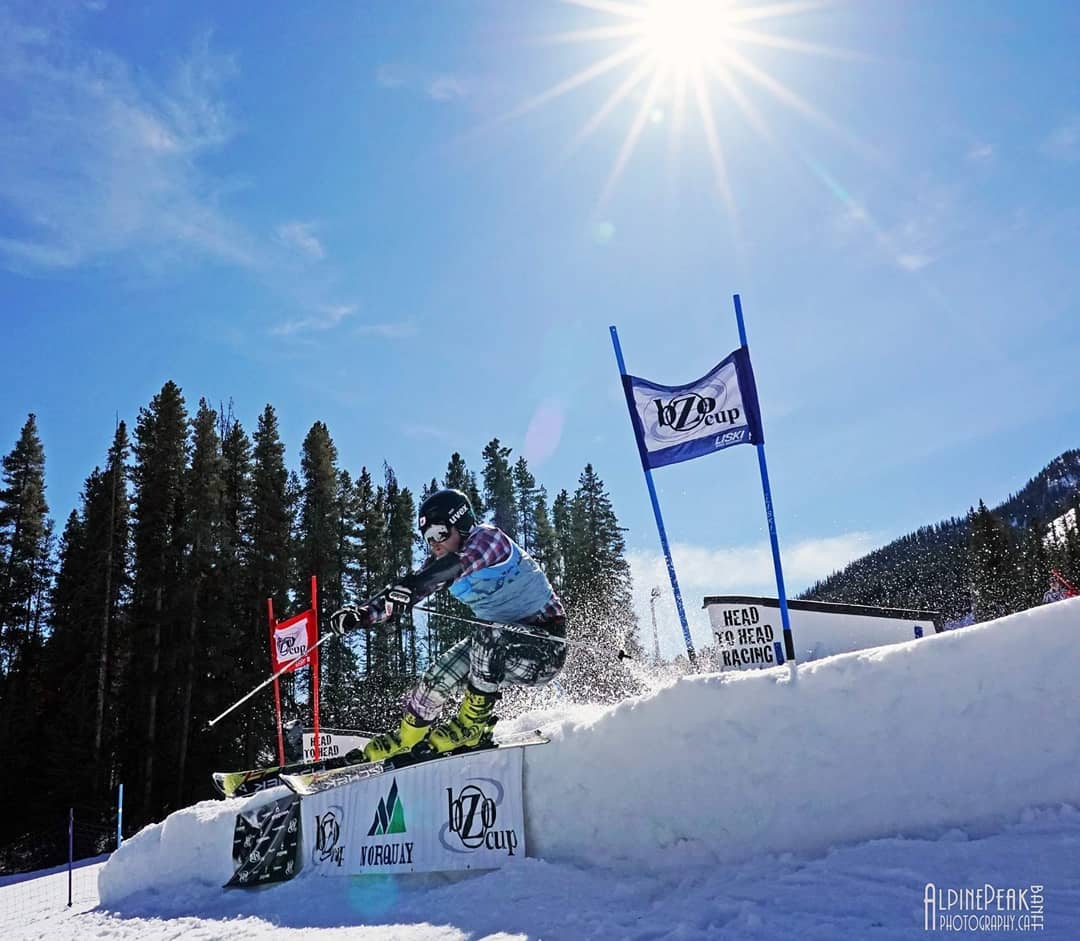Ski for Life
There are eight essential dimensions to wellness supporting healthy adulthood and successful ageing. These dimensions describe the basic elements of the Ski for Life stage and are the key components of being durable by design. The eight dimensions are interdependent and each is critical for life.
It's crucial at this stage to ensure that skiers do not overtrain because their bodies can be more susceptible to injury. The establishment of a sleep routine is essential; these routines will assist in managing the added stress of work, exercise and travel fatigue.
- Boys Lifelong enjoyment of skiing
- Girls Lifelong enjoyment of skiing
- Any age
- Master's Racing

Eight Dimensions of Wellness
Appropriate physical activity
Physical literacy is a common thread for keeping Canadians physically active from childhood to mature adulthood. Participating in a variety of activities can help the body increase its resilience to injury and stress, and in preventing chronic health conditions. Endurance sports, such as hiking, running, swimming and cycling help to manage weight and cardiovascular fitness.
Cognitive function
Maintaining optimal cognitive function throughout the life cycle is dependent on a number of lifestyle factors, including regular physical activity, appropriate daily sleep, diet, social interaction, and intellectual engagement. Human and non- human studies have shown that exercise enhances many aspects of cognition and brain performance.
Psychological well-being
There is also strong evidence showing that physical activity produces significant positive effects on basic psychological components such as confidence, self-esteem, social connectedness, and fundamental happiness. Studies have shown that regular exercise improves confidence and self-esteem and reduces depression among all ages of participants.
Social connection
Social connectedness is an important aspect of successful ageing. Belonging to social networks, such as teams, clubs, religious or cultural groups is an important means to building and maintaining social connectedness.
Embracing life transitions
Major life transitions can serve as an opportunity to reflect on changes in lifestyle, including changes in exercise routines. Though research suggests that there are many barriers to engaging in physical activity in adulthood, it also demonstrates that regular exercise is essential to maintaining health and wellness later in life (King, Rejeski, & Buchner, 1998).
Managing chronic conditions
Chronic conditions can be a major barrier to engagement in physical activity. Unfortunately, they tend to multiply as individuals age and this contributes to further declines in physical activity. Managing chronic conditions begins with important lifestyle modifications, including appropriate physical activity.
Mindful nutrition
You can’t outrun a bad diet! Physical and cognitive functions are both impacted by nutrition. On one hand, Canadians need nutritious food to support active lifestyles. On the other hand, research shows that individuals also need good nutrition in order to acquire the most benefits from physical activity.
Durability by design
Physical literacy is the basis of durability by design. As Canadians stay engaged in physical activity, they stay stronger and healthier and thereby more resilient to falls, injuries, and disease.
SLEEP & REGENERATION
SLEEP
It's crucial at this stage to ensure that skiers do not overtrain because their bodies can be more susceptible to injury. The establishment of a sleep routine is essential; these routines will assist in managing the added stress of work, exercise and travel fatigue. A skiers total sleep requirement is the key to the foundation of post-exercise recovery and regeneration (PERR).
Changes in mood, concentration, motivation, endurance and recovery can hurt day to day performance and often is a result of a lack of sleep or cumulative sleep debt.
DURATION
- 7 to 9 hours per day.
- +30-minute nap between 2 pm and 4 pm
QUALITY
- Maintain a regular sleep/nap routine keep your sleep debt to a minimum.
- Naps can be combined with a dose of caffeine, either before or immediately after the nap.
- Ensure a comfortable sleep environment at home, when travelling and competing.
- Monitor for stress and anxiety which can result in insomnia.
- Initiate a regular napping strategy.
- Monitor for excessive sleepiness & fatigue.
If your sleep is poor quality seek help!
PHASE
- Maintain a regular sleep/nap routine.
- Get early morning light exposure for 30 minutes daily.
- Monitor for a delayed sleep phase indicating difficulty falling asleep and waking up for school.
- Maintain regular and reliable nutrition routines; breakfast is the most important meal of the day. Remember to "break" the "fast."
KEY POINTS
- Get your sleep!
- Maintain meal routines and always eat breakfast
- Learn to nap!
- Do not train if you are fatigued or sleep deprived.
- Reinforce the importance of a sleep routine.
- Avoid technology (screen time) before bed.
- Monitor cumulative sleep duration. Be aware that sleep debt equals <9 hours per night or <56 hours per week.
- Strategies for getting enough sleep include napping.
- Monitor caffeine intake.
- Sleep logs can be used to determine current behaviours and evaluated with the intent to develop training and recovery routines to match the sleep requirement.
DO NOT TRAIN IF YOU ARE FATIGUED OR SLEEP DEPRIVED!
Nutrition
You cannot outrun a bad diet!
Skiers of all ages need nutritious food to support active lifestyles and to acquire the most benefits from physical activity help to prevent chronic diseases like heart disease and diabetes.
Healthy eating is more than the foods you eat; Canada's food guide provides some great recipes, tips and resources. Adopting healthy eating habits can help you conquer bad eating habits and make the healthy choice the easy choice.
Healthy eating involves:
- Being mindful of your eating habits
- Cooking more often vs. dining out
- Take time to enjoy every bite of your food
- Eat meals with your family and others
- Use food labels to guide your choices
- Limit food high in sodium, sugars or saturated fat
- Always be aware of food marketing or diet fads, stick to the basics by eating plenty of fruits and vegetables, eating protein foods, choosing whole grain foods and making water your drink of choice
Canada's food guide also contains some simple recipes for breakfast, lunch and dinner. Check here to discover some delicious meal ideas.
Cognitive Function
Studies have shown that exercise enhances many aspects of cognition and brain performance (Grove 2016). Exercise plays a strong role in enhancing executive functions of the brain. Executive function includes planning, scheduling, and working memory required for activities of daily living.Similar to the effects of not exercising, the lack of cognitive stimulation will deprive the brain of the exercise it needs to maintain optimal function. Engaging in mental exercises, such as solving a puzzle or learning a new hobby, will strengthen the neuronal connections in the brain resulting in the building and maintenance of a cognitive reserve. Building a cognitive reserve can help to mitigate loss due to injury, illness and time. Recognizing the connection between regular exercise and mental engagement is an important component of maintaining durability throughout adulthood (Grove 2016).
Lifestyle factors that can help to maintain cognitive function:
- Regular physical activity
- Obtaining the appropriate daily sleep
- Eating a nutritious diet
- Maintaining social interaction
- Intellectual engagement
Durable by Design - Injury Prevention
Each skier will have a unique set of needs, goals, and interests surrounding skiing and physical activity. Every individual also has a unique health status and a different level of physical literacy at each point in their personal journey. Engaging in regular physical exercise is one of the best things skiers can do to ensure they can continue to enjoy the freedom of skiing while ageing successfully. A skier's most important tool is his/her body, doing what they can to defend it against injury is vital!Skiers can prevent most injuries by being physically fit and literate, and by wearing the appropriate and adequately adjusted equipment for the activity including ski racing and training.
Skiers of all ages should engage in resistance training, aerobic exercise, balance and flexibility training to ensure their bodies remain durable and fit to ski.
Skiers should seek to maximize their fun without putting themselves at risk of injury by following a few simple steps:
- Spend time completing a proper warm-up.
- Adapt and set up equipment to match the needs of the ski racer.
- Stay hydrated, it's crucial to replace lost fluids and minerals.
- Skiers should listen to what their bodies are telling them; go hard when there is energy! Take breaks when needed!
- Recovery is as important as preparation


